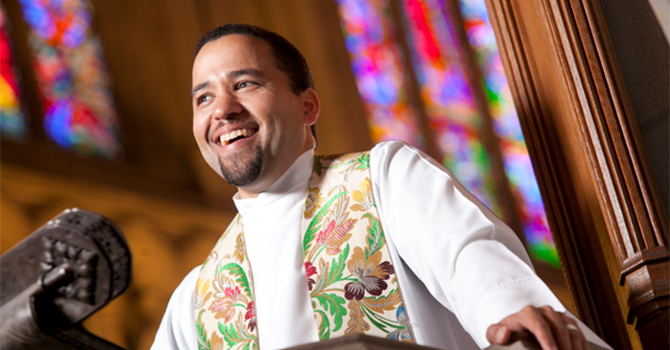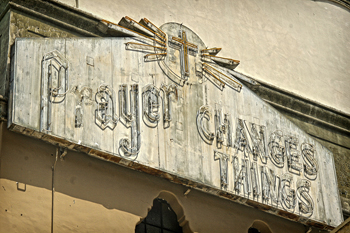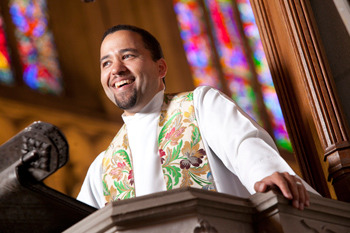Editor’s note: Faith & Leadership offers sermons that shed light on issues of Christian leadership. This sermon originally was preached on April 4, 2010, at St. John’s Episcopal Church in Wichita, Kan.
Acts 10:34-43; 1 Corinthians 15:19-26; Luke 24:1-12
There is a wonderful website, put together by an online magazine called SMITH, that it is a collection of six-word memoirs -- people both famous and ordinary trying to distill their lives down to six words about what is most important or distinguished or interesting about them. Everyone is invited to participate, and there is an ongoing gallery of the most recent offerings.
The site has also spawned several books, which collect the best of the stories; the first was called “Not Quite What I Was Planning,” and the most recent is titled “It All Changed in an Instant.” I find it fascinating, both how popular the site is and also what a challenge it is to try to fit something about our essence into such a narrow form.
Some six-word stories are poignant: “I still make coffee for two,” writes someone recovering from a breakup. Some are clever: “Well, I thought it was funny,” is the offering of comedian Stephen Colbert.
Some are tragic: the inspiration for the project was an old tale about Ernest Hemingway, who, challenged to write a story in six words, is said to have come up with this: “For Sale: baby shoes, never worn.”
Of course, my personal favorite is from screenwriter Nora Ephron: “Secret of life: marry an Italian.”
And this made me think that, for all the joy and fanfare of Easter, for all the complexity and mystery of our whole religious life together, and for all the billions and billions of words we use to try and explain it all, that Christianity itself has a six-word autobiography, and it is this: Jesus is risen from the dead.
There are 775,000 words, more or less, in the Bible, and not one of them makes sense without these six words. There are roughly 2 billion Christians in the world, and not one of us has a thing to say without these six words.
These are the words that the breathless women carried from the empty tomb back to the other disciples. These are the words that have been passed from person to person, from community to community, every day since then -- in secret, in triumph, in darkness, in celebration.
It is these six words that have taken us from scattered, broken people who are lost to the largest religion in the world. It is these six words that have found countless individuals whose lives were already dead -- broken by pain and suffering, by sin and darkness -- and given them new life.
These are the words that are whispered at bedsides and shouted from rooftops and shared at dinner tables and workplaces and in neighborhoods. These are the words that have been forbidden by governments both ancient and modern, and yet somehow they have still been spoken, still been shared.
Jesus is risen from the dead.
These are the words that the martyrs sang as they were being burned at the stake, fed to the lions. These are the words that Dietrich Bonhoeffer, the German martyr who opposed the Nazis and was forced into seclusion, taught his students in the secret seminary he managed to hold.
These are the words that Oscar Romero was speaking as he was gunned down while celebrating the Eucharist in El Salvador. These are the words that Martin Luther King Jr. held fast to as he opposed the violent racism of our culture, the words that inspire Desmond Tutu’s work in South Africa; these are even the words that Mother Teresa admitted had lost meaning for her, at the end of her ministry. And yet she so believed in their meaning for the world that she did not abandon her work with the poor.
Jesus is risen from the dead.
Are these words true? If they are not, Paul says to the Corinthians, “we are of all people most to be pitied.”
If they are not, then millions -- maybe billions -- of people have gone to their graves unnecessarily. And millions -- maybe billions -- more continue to live in the tombs of whatever darkness and despair overshadows them. If they are not, then we are doomed to very short and pointless lives, and to be defeated by the suffering that we continue to see all around us. To be defeated by death itself.
But this is not our story, and not just because I say so or the church says so.
Of course, we hear all the time that Jesus’ resurrection cannot be proven, because nobody saw it; that it cannot be true, because people still suffer, they still die; that we cannot believe it, because it seems so utterly unbelievable.
To which we say: Jesus is risen from the dead.
How many lives have been transformed, starting with Mary Magdalene and her companions, falling to the ground in utter shock, upon hearing these six words? How could we possibly count the ways that billions of hearts have been “strangely warmed,” in the words of John Wesley, upon the understanding of these six words?
What could we possibly use to measure the impact that these six words have had upon the world -- the ways in which forgiveness, joy, reconciliation, self-giving love and charity have wrought miracles and abundance on the face of this earth in the time since we have first heard that Jesus is risen from the dead?
Is it true? Listen to the stories.
C.S. Lewis once said, “I believe in Christianity as I believe that the Sun has risen, not only because I see it, but because by it I see everything else.”
This is the story of our lives, the story of the life of the world, the story of life itself. It is the story of how life is stronger than death, how God’s love for us is stronger than death. It is, in the end, the only story that there is.
And so, in Easter, we hear these six words again: Jesus is risen from the dead.
How will these words change your story? Where in the essence of who you are do you hear the call to new life -- to come out of the tomb you’ve been sealed in, the tomb of fear or the tomb of hopelessness or the tomb of dreams that have been lost or delayed? Where are you looking for the living among the dead? How will you receive this news that has been handed from life to life, from heart to heart, from age to age, that is now handed again to you?
And how will these words change the world? What does our story still have to say to a world at war, a culture at odds, a people in pain? How will we be sure that they will hear our story of hope?
Every day we write our story again, and we say that it is no less true today than it was on the first day; it is no less miraculous today than it was on the first day -- no less shocking, no less joyful, no less important, no less life-changing and meaningful.
Jesus is risen from the dead.
Run and tell the others what you’ve heard.


















